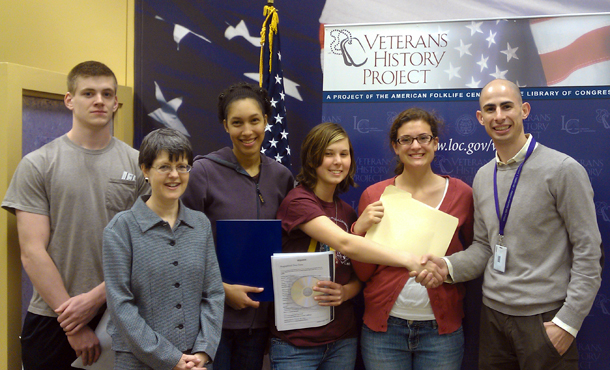Leroy Plaugher, a World War II army veteran, likes young people to be interested in the war, even if they go beyond the usual battle stories to explore the less-known stories of conscientious objectors and the men and women who were on a “different front line.”
Plaugher was among a group of veterans and conscientious objectors who participated in “Ways of War & Peace,” a spring 2012 class taught by Marti Eads, professor of English in the language and literature department at Eastern Mennonite University (EMU).
The course was designed to look at selected readings – memoirs, poetry, fiction and drama – emerging from World War II and examine them for clues about Christian attitudes toward war and peacemaking. In addition, students collaborated with conscientious objectors, veterans and their spouses to generate oral histories covering fresh ground.
“We should never forget the contributions of those who did not fight – those who kept feeding the people who were suffering because of the war,” said Plaugher.
About the course
When she could, Eads paired students from peace-church backgrounds with military veterans and students from non-peace-church backgrounds with conscientious objectors “so everyone involved would have a chance to engage in appreciative dialogue with someone from a different perspective.”
“Serious Christians have a wide range of views about war and peacemaking and taking time to hear each other out is well worth our while,” added Eads.
Becca Longenecker, an English and mathematics double-major from Lancaster, Pa., spoke with Landon Walker, a veteran, about his experiences during the war. Longenecker wrote in her final paper for class that by learning from the past and trying not to contribute to similar events, “I can respect his story and the suffering and loss that he and so many others that lived through WWII experienced.
“I realized in thinking about my respect and admiration for Landon that I did not need to change my convictions about pacifism in order to respect him.”
For Amanda Grace Lewis, a social work major from Richmond, Va., the power of peacemaking stuck with her as she interviewed Hubert Pellman ‘38, a retired EMU English professor.
“I was amazed by how he took the ‘peace church’ tradition and showed his passion for Jesus’ teachings in all areas of his life,” said Lewis. “He chose to be a conscientious objector because of his belief in God’s love being stronger than human violence and conflict and the belief that God calls us, as Christians, to follow Jesus’ example of peace and nonviolence.”
Pellman said the “peace view” was broader than he had originally thought when the war broke out, but added, “I think peace means far more than saying, ‘I don’t kill.’ I think it means doing unto others as you would have them do unto you. It intersects with Jesus’ teachings and way of life.”
Eads said she hoped all the students would leave the class holding the peace position, but knew “real dialogue could be risky.”
“University life, though, ought to give students opportunities to examine beliefs closely and then own them for themselves.”
